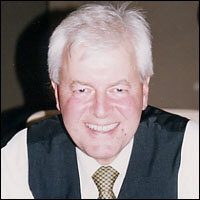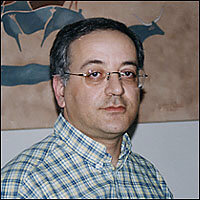
|

|

Interview with
Mr. Karl Alsmar,
ERICSSON Executive Vice President, Central & Eastern Europe, Middle East and Africa
Web site: www.ericsson.com |
With a slowdown in system and phone sales in Europe, does Algeria and the Maghreb region represent an important market for Ericsson's diversification?
We have had a focus on this region long before there was a slowdown in Europe - our philosophy is to continue our focus in all countries of the Mediterranean rim, and Algeria is one of them. Other European companies might now be thinking of investing in other markets like this one, but they will be late. At Ericsson, we have focused on developing these countries for a long time, and we have reinforced this process a year ago when we established a Market Area for Western Europe and another especially for Eastern and Central Europe, Africa and the Middle East.
As a company which is strongly established here, you also have an important joint-venture with SITEL. Could you tell us about your experience as a joint venture partner?
In fact, we started doing business here over 30 years ago. Our way of doing business is through perseverance - we look at long term objectives, and when things do not go well we do not pull out, on the contrary, we will stay in until things get better. If rain is pouring down on it today, perhaps the sun will come out and shine the next year or after that.
We started our joint venture with SITEL in 1987, but we had actually arrived here in Algeria in the 1960s and established a permanent Ericsson office in 1973. So when business grew, we invested in the joint venture with SITEL, which is a good example of a strong local partnership. In fact, SITEL is one of the companies in Algeria where you can talk about state-of-the-art technology, so we are very satisfied here.

Ericsson has a partnership with SITEL. Would you say that this positions Ericsson to win the next GSM contract in Algeria?
We have number of experts here to transfer knowledge in terms of technology. In fact, SITEL is run by a strong group of people who are top of the line. Algerians are even working with Ericsson in other African francophone markets. Local competence is tremendously important, because that is the element that takes the longest time to build. You can build a factory, but building competence and know-how to support systems is essential. Moreover, all our systems use the same technology for mobile systems as our fixed networks, so it is easy to relate to it. Therefore, in the Algerian Ministry of Telecommunications, they are confident with the system and can simply add-on to their training because they already have a base of knowledge of our networks.
We have already delivered a system for about 100,000 customers, which is not enough because demand is much bigger, so now it is a question of increasing our investment. In general, Algeria's penetration rate is very low, and could be much higher if the conditions are right. Of course, we have a very good position and a strong presence in the market, and we are also going to develop SITEL from being a purely manufacturing to a service-oriented company as well.
You have won GSM licenses in Morocco and Tunisia recently. What would you say is the secret of your success to penetrate these markets?
The first thing is that we have already been operating in these markets for a long time, so when we bid for GSM, we already have a presence, our brand is well known, we have a good reputation, we have good contacts.
In that vein of partnerships, I understand that you are becoming locally involved with university programs. What kind of programs are you looking to be involved with in Algeria?
Our move forward is to develop SITEL into the service dimension, into competences and service providing. We are also looking at working closer with the education system, like universities and technical schools. This is an area where we plan to invest in, and we feel that we are well suited to provide competences in new areas. It is very useful to sponsor certain faculties and help them with their curriculum and course material. The advantage is that it also helps to develop job opportunities in the country. When they know that they are working with our technologies here, they do not have to go to France, the US or the UK to work with the latest technologies - they can do it right at home, while bringing an added value to their training.
| If we look at the market in general, and the reforms that the Minister is undertaking, as a foreign company here are you satisfied with the speed of the reforms and the state of the Algerian telecom market?
Reforms can always be sped up... Of course we would like the privatisation program to go faster than it is going today, but in general we support the plan outlined by the Minister of Telecommunications.
What can the country do to facilitate and promote investments?
One suggestion is to look at the framework. Algeria must ensure the predictability of the market, for if you say that there are certain steps for privatisation and you establish a framework for this, then you have to stick to it or else investors will become nervous. That is one thing that the country has to prove to investors.
Another piece of advice is that investments have to be made with a long term view - you cannot give up after four years, you have to accept that there will be tough years and easier years. In the long run you will be rewarded, but you have to persevere. It is true that we have had a number of difficulties in the past, but we decided to stay here in Algeria. This is part of our philosophy, and we have also stayed during difficult times in other countries like Serbia, Kosovo, Bosnia and Saudi Arabia, for example.
In effect, you are often like a pioneers who constantly face new barriers...
It is part of our culture to look long-term, and we have been rewarded for it. We were in Nigeria a few weeks ago, and they really appreciated that we stuck around with them for many years. We can afford to maintain that principle because we have an extensive portfolio of countries; we are now in 35 countries in Africa, in the entire Middle East, and in almost all countries in Central and Eastern Europe... so we can balance an economic slowdown in one country with economic growth in another. I remember when there was a slowdown in Latin America - yet that was during the years when the Middle East was booming. Now Western Europe might have a couple of years where growth will not be as strong, but Latin American countries like Mexico, Brazil and Chile are coming back, and the Far East is also starting to move again. So thanks to our portfolio, we can afford to be present in a few countries where profitability is not high and continue to maintain our presence in order to be prepared for future ups and downs.
Having said this, what would be some important challenges you have faced, and how did you overcome them?
The major challenge today in the entire telecommunications business is the transition from the 2nd , or 2.5 generation system, to the 3rd generation. When money is taken out of the telecommunications business in some countries in terms of taxes or high license fees, it may be dangerous. This may have an effect on us, and may also transpire to this part of the region because some global European based companies have problems on their own turf and do not always have the financial resources to buy into companies in developing countries at this point in time. So even if some want to have a greater presence in Africa, they may not have the money to invest. Some operators need to sell assets to keep their balance sheet inorder, and that can have an effect on vendors, also in terms of how much additional bridge financing is requested. The banks are also being more cautious in the telecom sector.
If we talk about Algeria, it is a country with a good economic situation, and right now they need partners to speed up the transformation of the privatisation process. They realise that the goal right now should not be to increase demand, but to acquire competence and speed up the transformation process. Another element is that duties are very high, and should be lowered to encourage further investment and transparency.
Obviously, Ericsson is here to stay. What would be your final message regarding your presence here in Algeria?
From our position, we see tremendous opportunities here. Algeria is in a good position and has a very young population, which is a growing market that evolves quickly and has lots of spending power.
We are not only determined to move with the market, but also to take pro-active initiatives to to promote and stimulate the economy. The young Algerian population is quickly adopting new trends from Europe, and we feel that we are in a position to quickly move forward and develop this market. |
© World INvestment NEws, 2001.
This is the electronic edition of the special country report on Algeria published in Forbes Global Magazine. 12th November, 2001 Issue.
Developed by AgenciaE.Tv Communication |
|
|
| |
| | | |
|

